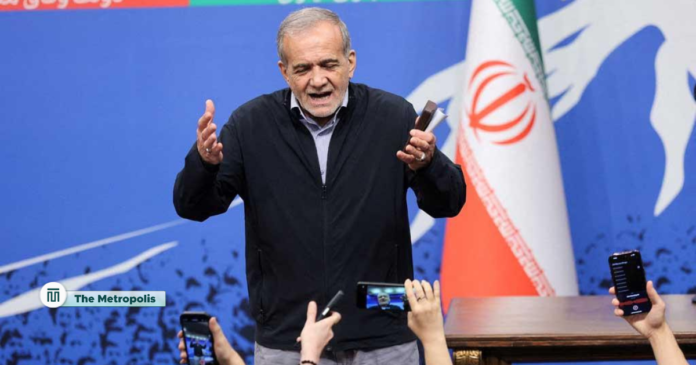Iran’s president warned of the “irreversible” consequences of Iran’s decision to join the nearly a year-old conflict in Lebanon between Israel and Tehran-backed Hezbollah, saying that Israel wants to drag the Middle East into a full-blown war.
After arriving in New York to attend the UN General Assembly, Masoud Pezeshkian addressed a group of journalists and stated, “We do not wish to be the cause of instability in the Middle East as its consequences would be irreversible.”
“We want to live in peace, we don’t want war,” he stated. “It is Israel that seeks to create this all-out conflict.”
Relatively moderate politician Pezeshkian, who was elected in July on the platform of a practical foreign policy, charged that the international community was remaining silent about what he called “Israel’s genocide” in Gaza.
Pezeshkian called for dialogue to end the Middle East conflict after Israel launched a heavy barrage of airstrikes against Hezbollah on Monday, the deadliest day in Lebanon in almost a year of fighting between Israel and the group backed by Tehran.
Pezeshkian responded, “We will defend any group that is defending its rights and itself,” when questioned about whether Iran would get involved in the dispute between Israel and Hezbollah. He didn’t go into detail.
Josep Borrell, the head of EU foreign policy, who was in New York as well, called the state of affairs almost like a full-scale war. “This is the time to do that here in New York,” he said, pleading with world leaders to take all necessary action to put an end to it.
The near-daily firefights between Israeli forces and Hezbollah have forced tens of thousands of people from towns and villages on both sides of the border. According to Israel, a diplomatic solution that would see Hezbollah retreat further from the border is what it prefers.
But Hezbollah asserts that only the conclusion of the Gaza War will bring an end to hostilities, despite the fact that it too wishes to prevent all-out war. After months of stalling negotiations mediated by Qatar, Egypt, and the US, efforts to establish a ceasefire in Gaza have reached a standstill.
The elite Revolutionary Guards, who report only to the country’s supreme leader, Ayatollah Ali Khamenei, determine Iran’s regional policies.
Since taking office last month, Pezeshkian has reaffirmed Iran’s opposition to Israel and its backing of resistance movements throughout the region.
When asked if Iran would take revenge for the late July killing of Ismail Haniyeh, the leader of the Palestinian militant group Hamas, on its territory, Pezeshkian replied, “We will respond at the appropriate time and place, in an appropriate manner.”
Fears of direct conflict between Tehran and its arch-enemy Israel in a region rocked by Israel’s war in Gaza and a worsening conflict in Lebanon have been aroused by Haniyeh’s killing, which both Tehran and Hamas have blamed on Israel.
Khamenei and the formidable Guards of Iran have promised “severe” retribution for Haniyeh’s death, which occurred during his visit to Tehran. Tehran has refrained from taking direct action against Israel thus far because the latter has neither acknowledged nor denied its involvement.
In August, three high-ranking Iranian officials told Reuters that Tehran has been in close communication with the US and other Western nations in order to determine how much retaliation to exact against Israel for the killing of Haniyeh.
The Iranian-backed Hamas and Israel were supposed to reach a ceasefire agreement within a week, according to Pezeshkian, but that week has never arrived and Israel has continued to escalate its attacks.



